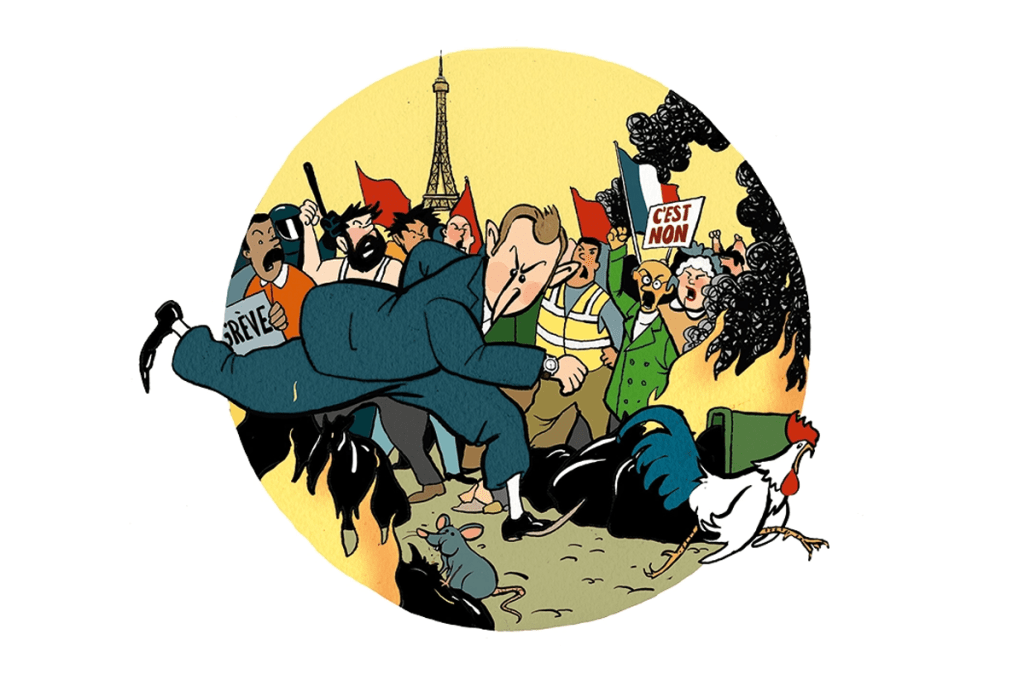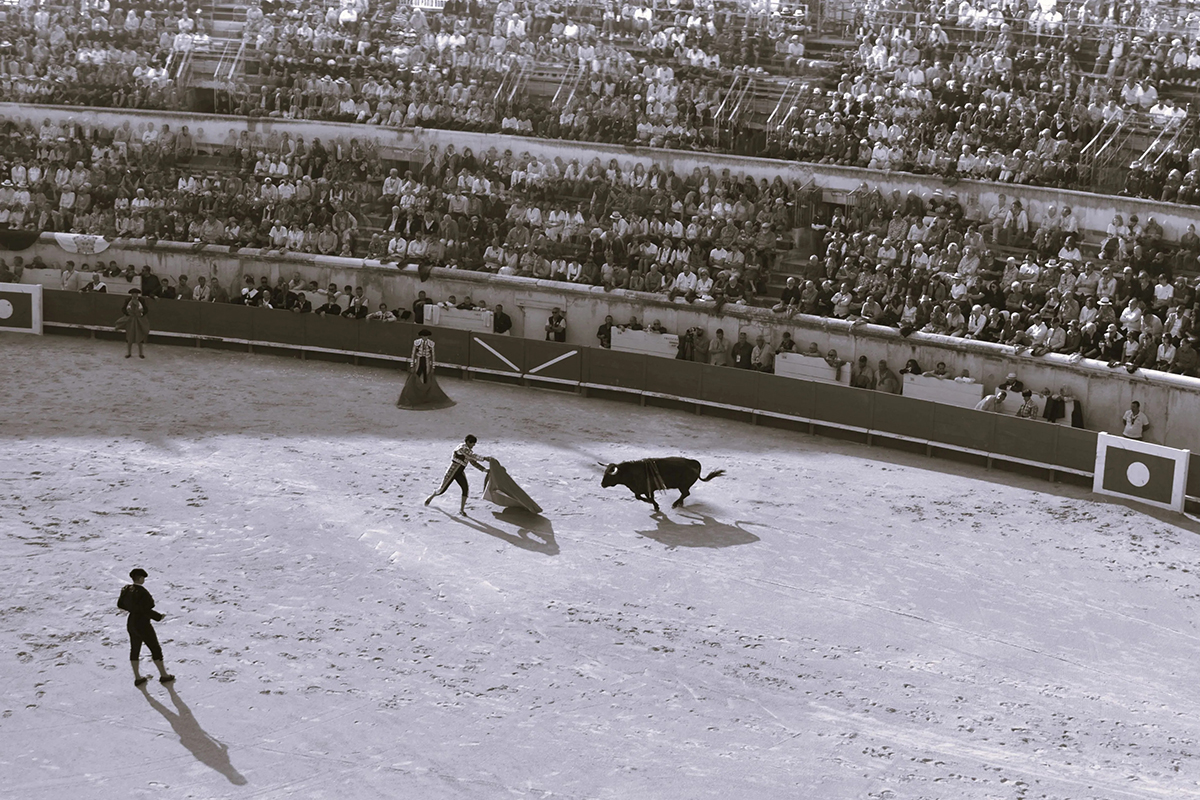Every generation or so, French politics is decided on the streets. The May 1968 unrest in Paris spread worldwide; Jacques Chirac’s welfare reform agenda was ended with the 1995 disturbances. The spirit of revolt is so alive in French society that a special police force exists for such occasions, specializing in crowd control. Now President Emmanuel Macron is facing another sustained revolt. Eight weeks into the battle over his pension reforms, it’s far from clear who — if anyone — is winning.
Police cars and buildings have been set alight in Strasbourg, Lille, Saint-Étienne and Bordeaux. In Paris, garbage men have just ended a three-week strike: some 10,000 tonnes of trash is piled up on the streets and the city is infested with well-nourished rats. In western France last weekend, at the site of a proposed reservoir, violent confrontations between police and eco activists resembled scenes of war.
Such events make other strikes seem piffling. Millions have taken to the streets in demonstrations called by the unions. They are demanding the withdrawal of the president’s pension reform, which he is attempting to impose by decree after it was voted down by the National Assembly. Have there been two million protesters in all? Five million? Eight million? It depends on who’s counting. High school and university students have joined in. French air traffic controllers (who are allowed to retire aged fifty-two) have disrupted flights all over Europe. It adds up to a national tantrum, in which all logic has gone missing.
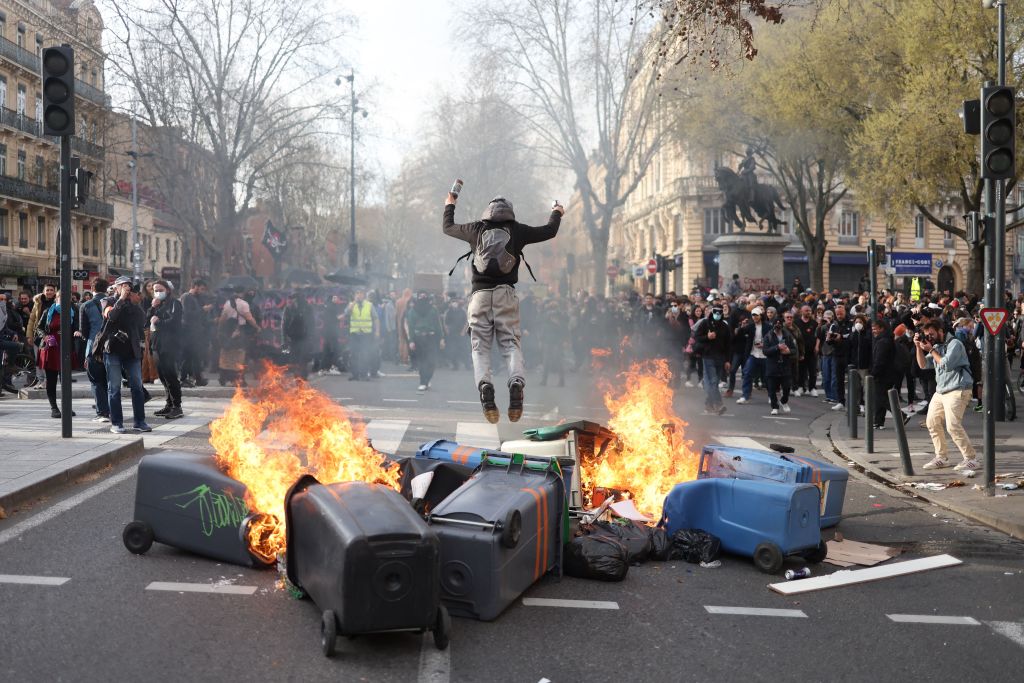
Macron’s proposed reform — to lift the state pension age from sixty-two, one of the lowest in Europe, to a still quite low sixty-four — is perfectly rational. The country’s solvency is at stake. When the generous pensions system was set up in the postwar years, life expectancy was sixty-six. Now it’s eighty-three. The cost of pensions has pushed government spending in France to 59 percent of GDP; pensions spending is 14 percent. These are some of the highest figures not just in Europe but in the developed world — and will become worse without reform.
When the generous pensions system was set up in the postwar years, life expectancy was sixty-six. Now it’s eighty-three
Macron is right: something has to give. It may already be giving. Reports suggesting that France is a failed state — or on the verge of constitutional collapse — are probably exaggerated. But it’s harder to be sanguine about Macron’s future. Just one year into his second five-year presidential term, he cannot stand again. This is his time to make the changes his predecessors shirked; to put his country into the recovery position. But by choosing this fight now, and seeing it as a trial of strength with the protesters, he may have badly miscalculated.
Macron’s authority is being visibly defied by millions of his countrymen. He was caught last week in a live interview clumsily hiding his €2,400 ($2,600) watch from viewers: the clip instantly went viral, seen as a Marie Antoinette moment. He is being vilified on social media with cruel memes. Even once-adulatory journalists have taken against him. There are whispers of presidential rages, interspersed with melancholia.
Not so long ago, Macron had hoped to be the leader not just of France but of post-Merkel Europe. But he is a victim of his own indifference to the dirty business of domestic politics. He seems much more interested in being an international statesman than in the thankless business of governing his country.
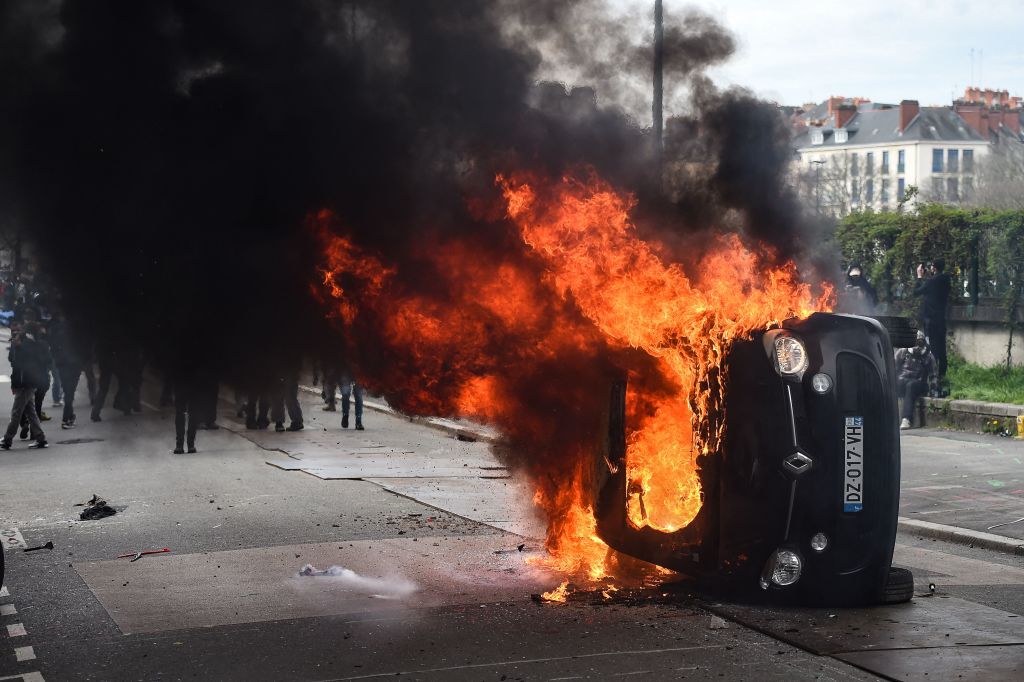
As the massive disturbances continue, Macron appears to be in a state of denial: an angry television address last week only served to make things worse. If he wants to face down his country, he’ll find his country equally determined. A poll found 62 percent are in favor of intensifying the strikes and saying they blame Macron — not the protesters — for any violence. There has been no shortage of that, with 440 police officers injured in a single day last week.
A crisis meeting at the Elysée with Élisabeth Borne, Macron’s prime minister, produced an anemic promise that he was ready to talk to the unions — but not to withdraw the reform he pledged in his re-election campaign. His offer was immediately rejected by the unions and denounced by the parliamentary left, led by Jean-Luc Mélenchon, who has been touring talk shows to promote his radical agenda in a manner that has led him to being compared with Robespierre. As for Marine Le Pen, she is playing the stateswoman in this, criticizing the president while avoiding inflammatory comments. Her party is thriving in the latest polls.
Macron has few remaining friends. Half his cabinet is after his job, including the interior minister, the sinister Gérald Darmanin. He presides over a police force that many say (and which much video evidence suggests) is largely not in control — so responds the only way it knows how, waving batons behind clouds of gas. Darmanin has been warning that “radicalized elements from the left and ultra-left” are hijacking the union processions and pushing France to “fire and blood.” Luckily for him, police pensions are not under threat: officers can take retirement from the age of fifty-two and there’s no plans to change that.
Plus ça change, some might say. That the French are susceptible to periodic outbursts is not news. It is a fundamental part of their national character and history. So why is this different?
For a start, what happens in France doesn’t stay in France — especially with EU economies in turmoil and war on the union’s borders. The weakness of France and of Macron is changing the political geometry in Europe and beyond. It has overtaken socialist Sweden for tax-and-spend, its army is reportedly running out of ammunition, and the colossal €3 trillion ($3.2 trillion) national debt is more than 113 percent of GDP and still rising fast. France is rather comfortably living beyond its means: bingeing, but never paying the bill. And rebelling quite violently at any sign of reality biting.
Macron would have relished the chance to pose with King Charles at a banquet in Versailles — a glorious spectacle to mark the reset of relations with the United Kingdom, which have been badly damaged since Brexit and exacerbated by disputes over the small boats. But the royal visit was canceled amid the turmoil.
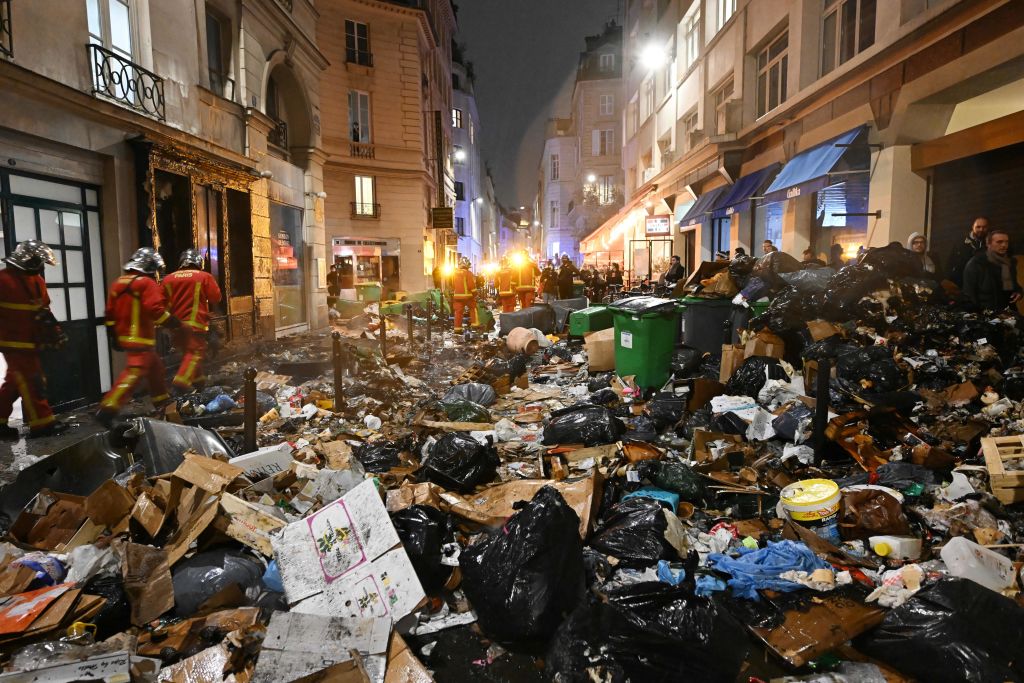
If France is incapable of assuring the safety of one head of state, how can it assure the safety of the millions coming to Paris next year for the 2024 Olympics? The games were to be a massive PR opportunity for President Macron. He was hoping to welcome the world to France, the start-up nation.
The debacle last May at the Stade de France, where Liverpool soccer fans were robbed by local thugs before being attacked by the police, has not inspired confidence. The Olympics are a tempting target for terrorists, domestic troublemakers and thieves. Senior people in the French security sector are very concerned, I am told.
A paradox of the current events is that the unions taking to the streets with their red flares and clenched fists represent some of the most privileged workers in Europe. They are defending the indefensible. There are 42 pension regimes, many absurdly generous. The former railway conductor in my village retired at fifty-one on €2,500 a month — which he might well draw for the next thirty years. The Lycée students taking up arms don’t seem to grasp that they will be the ones paying for this all of their working lives. Macron has struggled to make this basic point.
The figures are easy enough to explain. When the pensions system started, France had more than four workers for every retiree. That ratio is now close to 1.7 and is projected to fall to 1.5 over the next decade, according to French government advisors. The French tax rate — already the second-highest in the developed world — will only increase as fewer workers shoulder the surging cost. Some 80 percent of French pensioners own their own home and will have a pension paying only marginally less than the average salary.
Macron has tried to argue that raising the pension age is the only way to preserve the system’s generosity without increasing taxes even further. He has warned that “there are no more peace dividends as a result of Russia’s aggression in Ukraine” — but the truth is that even his own proposed changes won’t keep the system afloat for long. If his legislation passes, it will provide only a spell of fiscal relief before the system returns to insolvency after 2030, according to Frédéric Bizard, an economics professor at Paris-based ESCP business school.
Perhaps this is what fuels the anger on the streets: a sense among the French that they’re living in the end-days of a bubble — and that if sanity returns, pension reform would just be the start. And that if the president gets this reform through, he’ll have four more years in power to keep squeezing. But since Macron’s re-election last year with a greatly narrowed majority (followed by his failure to win a majority in the Assembly), the pathology in French politics has become extremely dangerous.
France’s traditional political institutions of the Socialist Party and the centrist republicans have become rotten. Le Pen looks increasingly as if she could win the next presidential election. She inhabits an economic cuckoo land, promising to take the age of retirement back to sixty for some (as François Mitterrand did for all when president. He also created a Ministry of Free Time). This is the politics of delusion. But there seems to be quite a market for that in the streets of Paris.
Despite his arrogance, lack of empathy for voters and unconcealed disdain for those he considers his intellectual inferiors, Macron has often been correct on what ails France and what needs to be fixed. But getting anything done is proving exhausting and disheartening. He has the power to keep ignoring the demonstrations, at least for a while. The police have lots of tear gas. But should the constitutional council declare his reform decree invalid, it could lead to a new election for the Assembly, which could probably see further gains for Le Pen.
It will require a dramatic reversal of fortune to save what’s looking like a failed second term. Macron is quite right in saying that France needs radical reform. But his most notable achievement thus far has been to unite the country against him.
This article was originally published in The Spectator’s UK magazine. Subscribe to the World edition here.



